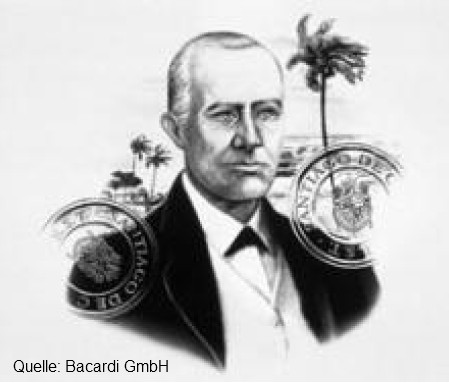Untameable (1862)
The 2009 film, The Rum Diary, based on Hunter S. Thompson’s novel of the same name, provided the venue where Johnny Depp met Amber Heard. Their relationship ended in an acrimonious divorce and an infamous defamation trial. Yet the original rum diary began with Bacardi Rum, the brew created by Facundo Bacardi.
The family that could have sprung from the mind of Gabriel Garcia Márquez intersected with figures such as Fidel Castro, Ernest Hemingway, and Desiderio Alberto Arnaz y de Acha III, (Desi Arnaz). The dynasty began with the Spanish born son of an illiterate bricklayer, Facundo, in Santiago de Cuba, when the country was a Spanish colony. He experimented on a recipe for rum in the dirt-covered floor of his distillery and came up with a far smoother product than the one favored by pirates. After christening it with his surname, Facundo chose a logo from the bats that flew about his distillery’s rafters. While the contemporary connotation of the nocturnal creatures conjures visitors from the crypt seeking satiation with blood, in that time and place they were a symbol of fidelity, discretion, and solidarity. In actuality, a goose laying a golden egg would have been more apropos. The founder signed the labels of each of his bottles to authenticate them from counterfeiters. To mark the commercialization of his rum, his son, (also named Facundo), planted a coconut tree, El Coco, outside the distillery. The legendary tree was to withstand a fire, earthquakes, and hurricanes. Local lore held the belief, “The Bacardi Company will survive in Cuba so long as El Coco lives!”
Emilio, the eldest of Facundo’s three sons, transformed the business into a gold mine; Ernest Hemingway downed daiquiris, (named after the Cuban town of Daiquiri), laced with Bacardi rum. Emilio was also enmeshed in Cuba’s fight for independence and smuggled arms to his fellow freedom fighters. Another cause was his dedication to freeing the slaves who toiled on the sugar cane plantations. Despite his revolutionary agenda, and time spent in prison, Emilio still managed to run his family’s company. A century later, José (Pepin) Bosch, the husband of Facundo’s granddaughter, was also committed to “Cuba libre!” In 1957, Fulgencio Batista’s military police retaliated by arresting José’s son. A fierce opponent of the dictator’s regime, José raised funds in support of Fidel Castro. However, when Castro assumed power, disillusionment quickly set in with the advent of firing squads, suppression of the media, and imprisonment of critics. In 1960, Castro confiscated the Bacardi distillery, and the family fled into permanent exile to South Florida, Puerto Rico, and the Bahamas. A company executive, the grandfather of Desi Arnaz, also escaped. In a nod to poetic justice, the nearly century old coconut palm withered. From his home in Miami, José plotted Castro’s demise.
José, who had the prescience to have set up a company in Puerto Rico, (each Bacardi plant has a palm tree), allowed the rum dynasty to rebuild their expropriated empire into a multinational behemoth. For nearly a decade, Bacardi rum has outsold any other brand in America; Smirnoff Vodka, (named after P. A. Smirnoff,) places second. The company has made Facundo’s descendants denizens of the financial upper crust. Although the private family keeps a sugar cane curtain on their assets, Marc Anthony bought a $19 million Coral Gables, Florida, mansion from Hilda Maria Bacardi. Monica Bacardi’s wealth is estimated at £500 million-£600 million. However, fights over money and the family firm have left permanent scars.
Despite all the ramifications of the distillery empire, the Bacardis remain strong as evidenced by a media campaign, “Some men are kicked out of bars, others are kicked out of countries. Sorry fate-you picked the wrong family.” The captions are from a Bacardi advertisement entitled, “Untameable.” 

